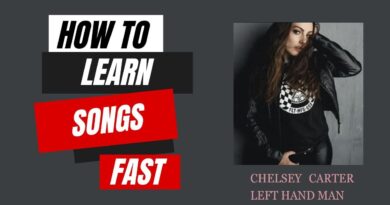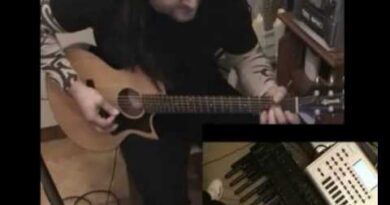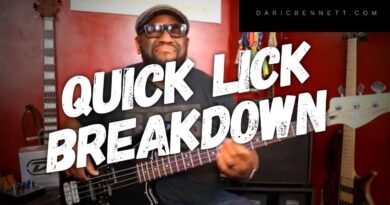Learning Bass: 10 Things NOT To Do
In this video, I share some things I wish I had learned earlier when learning bass guitar.
Check Out My Online Courses Here:
https://philipconradmusic.teachable.com/courses/
Get Your Own Pocket Hat (directly supports the channel):
https://philipconradmusic.squarespace.com/merch
Gear I Love to Use (Affiliate Links):
Universal Audio Apollo x4: https://sweetwater.sjv.io/rQr3Rv
Universal Audio Volt: https://sweetwater.sjv.io/PyE9Be
UA Essential Plugins: https://sweetwater.sjv.io/Kjmmda
JMJ Bass: https://sweetwater.sjv.io/OrEM2n
Allen Woody Rumblekat (became Snorlax): https://sweetwater.sjv.io/XY4XYo
Danelectro Electric Guitar: https://sweetwater.sjv.io/21zq27
Bronco Bass (became Liz): https://sweetwater.sjv.io/Y9PGLP
Ampeg Venture Amps: https://sweetwater.sjv.io/R5dEmg
Levy’s Wall Hanger: https://sweetwater.sjv.io/JzX0jq
Yamaha Speakers: https://sweetwater.sjv.io/0ZzvrR
Moog Theramini: https://sweetwater.sjv.io/75qrdg
Hx Stomp XL: https://sweetwater.sjv.io/m51PW1
Origin Effects BassRig Super Vintage: https://sweetwater.sjv.io/4PMvQo
#Learning #Bass
Originally posted by UCfRlprx-BEhwuVTWlHVyN6A at https://www.youtube.com/watch?v=ead6gP8UkdA




i) Focus on drums
ii) Have fun
iii) Get a proper setup
iv) Play slow, avoid sloppiness
v) Focus on how you sound in a band
vi) Triads are more useful than scales
vii) Learn multiple techniques
viii) go outside and jam with others
ix) you are a Jedi
What a nice video. My teacher, as a bassist for a famous spanish group teaches me to do a lot of techniques, licks and also finger style AND using picks. Also playing slow and taking care of melody and the drums. You are so right. Also ui wish i could play with more people but it's hard haha
The pick story actually just happened to me
I just sprained the tip of my finger, after having it scannedz the bone got cracked a bit, and it got swollen like an elephant
But the funny thing is, since september of last year idk why i just somehow randomly practice my thumb and pick playing
I literally practice everything i usually do with thumb and pick
Like doing fingers warmup, doing scales
Playing the 3 fretboard zones from sbl, literally everything with thumb and pick
So my finger got injured in 1st week of january, and honestly i didnt really get any problem playing bass week to week cause i have pick and thumb
(Changing inbetween them is kinda annoying tho)
Locking in with the hi-hat! That's always been my crutch in bands! As a one-man band, I substitute the hi-hat with a tremolo pedal and it usually locks me in with my drum patterns in a cool way
Great video, Philip. It’s very encouraging what you said. And I really appreciate it, because I just started bass journey. ????
Dude, that last point is the one. I just joined a band and they all really dig me because I focus on making them and the song sound better. The difference between what they had before I joined and what we're working on now is just miles apart.
It's all about feeling what's missing in the song, tapping your knowledge base and adding that. And, 99% of the time, it isn't bass in and of itself that's missing.
Triads definitely right
It sucks when the drunmer cant keep time lol then tells me i have no talent lol always behind even by the guitarists several tImes
Love the Samurai / Jedi analogy ????????????
This is a great video and most of what you're saying is generally good advice for life. Very cool mate ❤
I may just learn this time around ????♂️????
Keep it up ????
All great points. I just turned 71 and played bass in what we called garage bands back in the late 1960s & early 70s. Sometimes we sucked but other times pretty good. Practicing by yourself is good but you cannot beat playing with others. Also, I set up all my basses myself, It's not that hard and there are plenty of YouTube vids out there to help you. Those garage band days were the best days in my life, and it is sad that not too many people do it now.
love that video…
great video brilliant advice, a lot of people that play bass more recently forget its a rhythm instrument and overplay massively like its a lead guitar or something it can sound cool but very rarely flows with a song so i definitely agree with having restraint when i play bass i know I'm a rhythm to keep beat like drums while the lead and rhythm guitar are the highlights unless its a song that specifically has a bassline intended to be the main riff like in some hives songs etc and the guitars keep the tick with the drums, some styles require you to be more busy like Wooten Charles Berthoud styles etc but your not going to be playing like that in any band or situation overplaying is very common these days in bass, excellent video
thx u for sharing your tips : )
triads are necessary
as a drummer i thank you❤????
The Yorkshire Ricky won the day. Charlie's got the chops but Danny's got the tone and the feel. BEHS!
The bass player is the link between the rhythmic and the melodic. The viscera and the cerebra. They are the daywalkers. It's an incredible responsibility. Maybe the 11th tip should be "Don't let people give you crap about playing bass." It's an honor.
I enjoyed this video, thanks!
If drummers and bassists are the parents of the band then my ska group is about to be receiving a call from CPS
Been playing for over 25 years, all of these are very good tips.
Thanks for the part about simplifying. I'm a new player and this always stresses me out. I like learning my favorite songs from tabs and if there are parts that get a bit complex or require some faster fingering I tend to get discouraged and stop playing or get stuck until I get it right. Doing this makes it less enjoyable because sometimes there are fun parts of the song I miss out on. Now I skip over those parts and stick with getting the easy parts right and then come back and learn a simplified version of the hard parts so I can play the song all the way through. I find that later when I have advanced a bit more I'm able to play those parts properly and then revise the song. Getting all the way through a song for rhe first time even with simplified parts gives me a boost in confidence. Being able to go back and replay it properly after some time is the icing on the cake.
Love your video and as a guitarist I feel strongly urged to follow rule number 7 , the foundation of the song.
5. Scales are overrated – yes, so true. And focusing more on triads is not only more useful for basic playing, but for soloing too. Playing the chords is the way to go, I’d say master, almost any jazz standard (except perhaps modal jazz tunes).
I don’t change my strings. I haven’t change them since I bought the bass 2 yrs ago. Strings are very expensive. Is it alright?
Awesome tips. I would suggest a possible alternative to tip #6, that being "Learn your intervals". If you learn all of your intervals solidly, scales and triads, and even extensions become things you play through without having to think about how to play, so much as what to play.
Regarding Tip #7, yes, learn and practice all of your techniques, even different muting techniques for both hands, tapped harmonics, etc.,but make sure your primary techniques are all SOLID first. Treat technique like your pronunciation, and how you articulate what you are trying to say without words. Are you trying to whisper, or scream, or grunt, or slur your sounds? More often than not, saying less than necessary is best.
Another tip not on the list but has saved my butt on so many gigs: If your fingers are sore, put super glue on them, and let it dry. You might need to put a fresh coat on every couple of tunes, depending on how hard you play, but it can get you through most gigs, even if your fingers were literally raw and bleeding before you put the glue on. I recommend Krazy Glue, all purpose.
Bonus tip: One of the highest levels of mastery is playing a line so well and effectively that people hear notes that you're not actually playing, but implying and leaving space for their brains to fill in. So….Do not play ALL of the notes.
Great video! Excellent advice. Major Scale and Triads are like two oxen pulling a musical brain along. I know so many play by ear types who know chords all ways to Sunday, but can't separate an F from an F# and only know the major scale from a singing standpoint (Do Re Mi…).
Can't improvise melodies that are more than 65% in key and waste lots of time trying to explain why knowing the major scale on the guitar isn't necessary, if you have a good ear.
I'd rather jam with the scale guy, to be honest.
Plus, it's so easy to start learning triads after learning how to play a major scale from memory on the guitar.
Holy shit the triad thing was an instant like. Hell yeah.
I like to think that the rhythm section creates a bouncy, stable and dependable platform that the rest of the band plays on; like a trampoline
#7
Do not play a freakin boat heavy bass. Or if you do. Line up a good chiropractor.
Good advice for bassists of all levels.
Glad I saw your video! I totally agree on all points that you mention… I started playing/studying upright 4 years ago (jazz!) And have been asked to play the e-bass (which I played for short periods of time – as I played guitar too). It is a new world, loving it! Thank you for the tips and see you on Instagram! Greetings from Mexico!
Thanks!
You've got to be able to grow a good mustache as well ????
Thanks for the wise words! As a guitarist with over 40 years of bothering six stringed instruments I am really enjoying the change of playing around with a cheap bass ????
I’ve been playing on cheap instruments for almost 7 years and they served me well. I just finally bought a nice bass just under 1k on sale as a birthday gift to myself, but that’s a luxury I wanted after making sure bass was a passion of mine and something I really love. And it definitely is. And tbh, this may be the last bass I ever buy. I decided to go the buy once cry once route for an upgrade. I know if I care for it, it should last me a life time.
As a drummer who changed to bass hearing 'dont ignore the drummer' will always feel good. Too many beginner musicians dont take any acknowledgement of the drum parts
Peter !
As someone who plays bass myself, I think you've been spot on with about everything you've said. Especially that last part about being a servant. Very insightful.
The key note that I'd point out is that I don't think the "everyone keeps time" thing is set in stone. That's because sometimes the non-rhythm musicians may need to break formation to usher in the spirit and really help set the mood. So the rhythm pair is kinda the anchor for em. So all musicians contribute to the time and feel, but the drummer and bassist seem to take point in that regard.
Also, my personal way of viewing the band is like a mix between an airplane and a Star Trek ship. You have the drummer and bass as co-pilots, the keys player as the shield guy, the guitar or other keys player (gospel church background) as the weapons system, and the organist and music director as the captain in the chair at the center of the main deck (our music director plays both roles). We all contribute, and the captain is still in command, but the drums and bass are the de facto pilots of the ship. We may not necessarily run the ship…….we just drive it. ????????????????
And you're spot on regarding the servant mentality. Heck, you may even be a leader in a way. You have a LOT of power with the rhythm section, because people don't always hear you but they feel you.
Imo, a band (or music for that matter) is like a pyramid………..
…….._Every_ block in the pyramid is important. ????????????????????